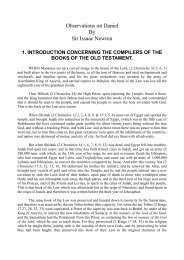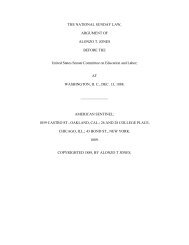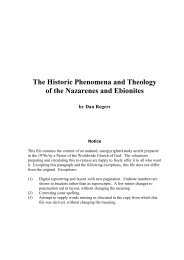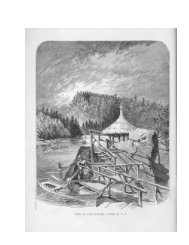THE EARLY CHRISTIAN SABBATH - Friends of the Sabbath Australia
THE EARLY CHRISTIAN SABBATH - Friends of the Sabbath Australia
THE EARLY CHRISTIAN SABBATH - Friends of the Sabbath Australia
Create successful ePaper yourself
Turn your PDF publications into a flip-book with our unique Google optimized e-Paper software.
The Early Christian <strong>Sabbath</strong><br />
letter, or in any o<strong>the</strong>r <strong>of</strong> <strong>the</strong> early letters attributed to Ignatius.<br />
The next reference to Sunday observance is doubtless genuine. It is one by Justin<br />
Martyr which will be quoted in <strong>the</strong> next chapter, in which he states that “on <strong>the</strong> day<br />
called Sunday” Christians ga<strong>the</strong>red to worship Christ. (The First Apology <strong>of</strong> Justin,<br />
chapter 67, in The Ante-Nicene Fa<strong>the</strong>rs, volume 1, page 186.) That this is a result <strong>of</strong><br />
second-century anti-Judaism, under <strong>the</strong> collateral pressure <strong>of</strong> contemporary sun worship,<br />
and not <strong>of</strong> first-century Christian practice, will be made very clear in succeeding pages.<br />
The next, a supposed “Lord's day” reference, is from chapter 14 <strong>of</strong> an ancient<br />
document, datable about <strong>the</strong> middle <strong>of</strong> <strong>the</strong> second century, called Teaching <strong>of</strong> <strong>the</strong><br />
Apostles, or The Didache.. The sentence has been translated to read: “On <strong>the</strong> Lord's day<br />
<strong>of</strong> <strong>the</strong> Lord come toge<strong>the</strong>r, break bread and hold Eucharist.”-The Loeb Classical Library,<br />
The Apostolic Fa<strong>the</strong>rs, vol. 1, P. 331. The Greek text is obviously garbled aria<br />
incomplete in sense, but it contains no word “day.” It reads literally: “According to <strong>the</strong><br />
Lord's [?] <strong>of</strong> <strong>the</strong> Lord, coming toge<strong>the</strong>r break bread and hold Eucharist!' A number <strong>of</strong><br />
words, appropriate both grammatically and in meaning, could be supplied at <strong>the</strong> point <strong>of</strong><br />
our question mark, and make as good or better sense than “day;” for instance, <strong>the</strong> word<br />
“commandment.” In any case, this is weak support indeed for <strong>the</strong> institution <strong>of</strong> Sunday,<br />
for which so much is claimed.<br />
We turn next to <strong>the</strong> church historian Eusebius, an earnest, advocate <strong>of</strong> Sunday as<br />
a substitute for <strong>the</strong> <strong>Sabbath</strong> <strong>of</strong> <strong>the</strong> Bible, who wrote about <strong>the</strong> year A D 324. He was<br />
thoroughly committed to <strong>the</strong> priestly authority <strong>of</strong> <strong>the</strong> bishops <strong>of</strong> <strong>the</strong> fourth century, a<br />
defender <strong>of</strong> <strong>the</strong> union <strong>of</strong> church and state effected by <strong>the</strong> emperor Constantine, and a<br />
eulogizer <strong>of</strong> this yet pagan emperor. He makes two references which are <strong>of</strong>ten quoted as<br />
supporting early Sunday keeping. One is in a letter he quotes as going from Dionysius,<br />
<strong>the</strong> leader <strong>of</strong> <strong>the</strong> church <strong>of</strong> Corinth about <strong>the</strong> year AD 170, to Soter <strong>of</strong> Rome. The<br />
significant sentence is: “Today we have passed <strong>the</strong> Lord's holy day; in which we have<br />
read your epistle.” - The Church History <strong>of</strong> Eusebius, book 4. chapter 23, in Nicene and<br />
Post-Nicene Fa<strong>the</strong>rs, 2d Series, volume 1, page 201. Since <strong>the</strong>re is no reference in <strong>the</strong><br />
Bible, or in any o<strong>the</strong>r writing up to this time, showing that any o<strong>the</strong>r day than <strong>the</strong> <strong>Sabbath</strong><br />
was established as <strong>the</strong> holy day <strong>of</strong> <strong>the</strong> Lord, <strong>the</strong>re is no reason to apply this reference to<br />
Sunday observance, as some do. The day is not, as a matter <strong>of</strong> fact, identified in <strong>the</strong> letter.<br />
The o<strong>the</strong>r reference from Eusebius (book 4, chapter 26) tells us that Melito, leader<br />
<strong>of</strong> <strong>the</strong> church <strong>of</strong> Sardis, wrote at about <strong>the</strong> year AD 175 a treatise whose title is usually<br />
translated A Book Concerning <strong>the</strong> Lord's Day. (Nicene and Post-Nicene Fa<strong>the</strong>rs, 2d<br />
Series, volume 1, Page 204) As a matter <strong>of</strong> fact, <strong>the</strong> Greek title as given by Eusebius<br />
simply reads A Book Concerning <strong>the</strong> Lord's [?]. The word “day” does not occur in <strong>the</strong><br />
title, and <strong>the</strong>re is no information given as to what <strong>the</strong> treatise actually dealt with.<br />
There is also a forged second-century epistle which quotes Old Testament<br />
condemnations <strong>of</strong> hypocritical <strong>Sabbath</strong> keeping and pretends to make <strong>the</strong>m an excuse for<br />
Sunday keeping. It seeks fur<strong>the</strong>r to establish Sunday by setting it forth as <strong>the</strong> eighth day<br />
<strong>of</strong> <strong>the</strong> week, and forcing it into line as a continuance <strong>of</strong> <strong>the</strong> Jewish principle <strong>of</strong> <strong>the</strong> eighthday<br />
circumcision. (Epistle <strong>of</strong> Barnabas, chapter 15, in The Loeb Classical Library, The<br />
Apostolic Fa<strong>the</strong>rs, volume 1, Page 395, 397.) The inconsistency and futility <strong>of</strong> this<br />
argument, <strong>of</strong>ten used <strong>the</strong>reafter, must be patent to all. It used a Jewish ceremonial<br />
requirement, occurring once in <strong>the</strong> lifetime <strong>of</strong> <strong>the</strong> Jew, as a basis for a supposed Christian<br />
festival, expected to occur iveekly in <strong>the</strong> worship experience <strong>of</strong> <strong>the</strong> believer. For all this<br />
16

















